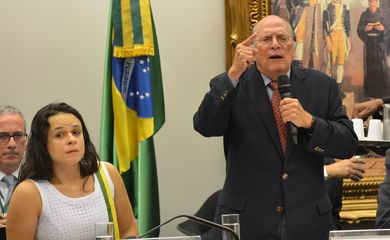Finance Minister to committee: government's accounts are within law




Finance Minister Nelson Barbosa makes President Dilma Rousseff's defense on the Impeachment Special Committee at the lower house
Finance Minister Nelson Barbosa said this Thursday (Mar. 31), on the Impeachment Special Committee, that the government's accounting practices comply with the current legislation and that there is no crime to justify impeachment proceedings against President Dilma Rousseff.
In the case of the transactions questioned by the Federal Accounts Court (TCU), the minister said that after the court made recommendations to change the fiscal administration, the government has immediately changed the methodology and paid all amounts indicated to the Brazilian Social Development Bank (BNDES).
Barbosa pointed out that spending decrees authorizing extra costs are legal practices and an instrument of budget transparency. He explained to the parliamentary committee that when the Congress makes room for reallocating resources; it observes the law. "Spending decrees do not increase costs. Every year Congress drafts the Annual Budget Law with the values that can be executed and establishes their limits. Thus, only by issuing a speding decree, expenses are not increased," he noted.
According to the minister, none of the six decrees mentioned in the impeachment petition exceeded the overall limit of the government's discretionary spending and technical reports have been produced on them. Barbosa reported that the total value of decrees ($ 27 billion) considered other budget allocations that had been cut and, therefore, they have not exceeded the budget limit. "Of the amount of decrees, most of them have been issued due to costs that had been cut."
The minister pointed out that "it is necessary to distinguish budget administration from financial administration. The budget law specifies how this can be done. It is about technical issues." Barbosa has used a daily situation to explain the difference to lawmakers: a person going to the supermarket with a shopping list.
"In the case, the person goes with a list to buy a kilo of rice, beans etc. This is the budget allocation. The financial limit is the amount of money you have in your pocket. On the way to the market, someone calls and asks you to buy 2 kilos of rice. It changes the budget allocation, but the person still have the same amount of money in their pockets. If you are going to buy 2 kilos, you are not buying something else," he explained, to illustrate what the government has done when altering the budget law.
About the government's relationship with state-run banks, Barbosa explained that there is a contract for services for the transfer of funds to financial agents. According to him, in some moments, a value may not match the value supposed to be transferred. To correct this imbalance, there is a supply account to pay the difference. According to Barbosa, when analyzing the 2014 accounting practices, TCU decided to improve the law and, also in 2014, the government, observing the law changes, paid the balance and issued decrees to authorize positive balances again.
The Impeachment Committee challenges the legality of delays in government's transfers to state-run banks to fund the payment of welfare benefits, like Bolsa Família conditional cash transfers program, unemployment insurance, and employee bonuses (known as fiscal “backpedaling”). Critics say that, with the delays, the government's accounting practices would show lower expenses until the Treasury sent resources to state-run banks.
Translated by Amarílis Anchieta
Fonte: Finance Minister to committee: government's accounts are within law


